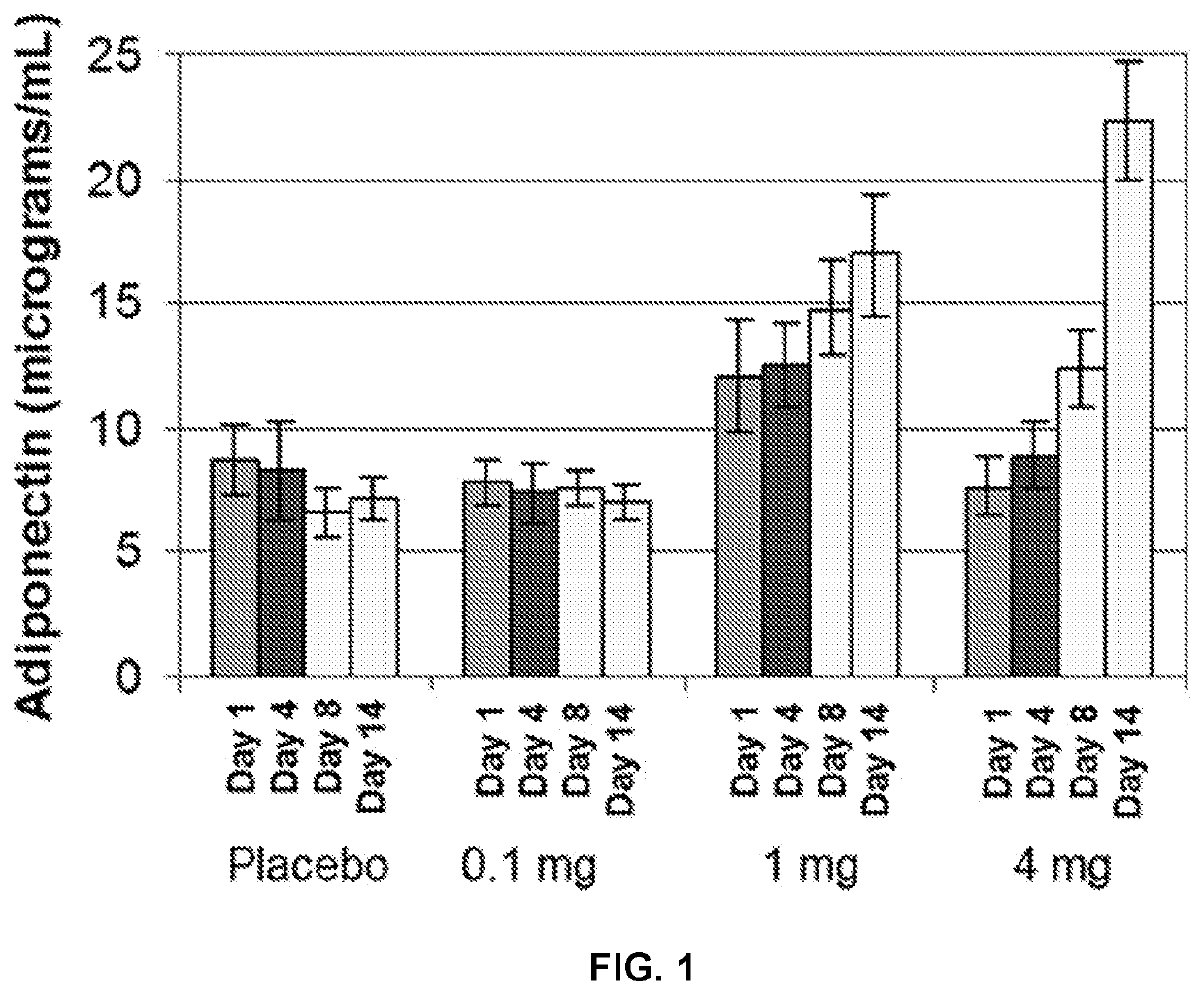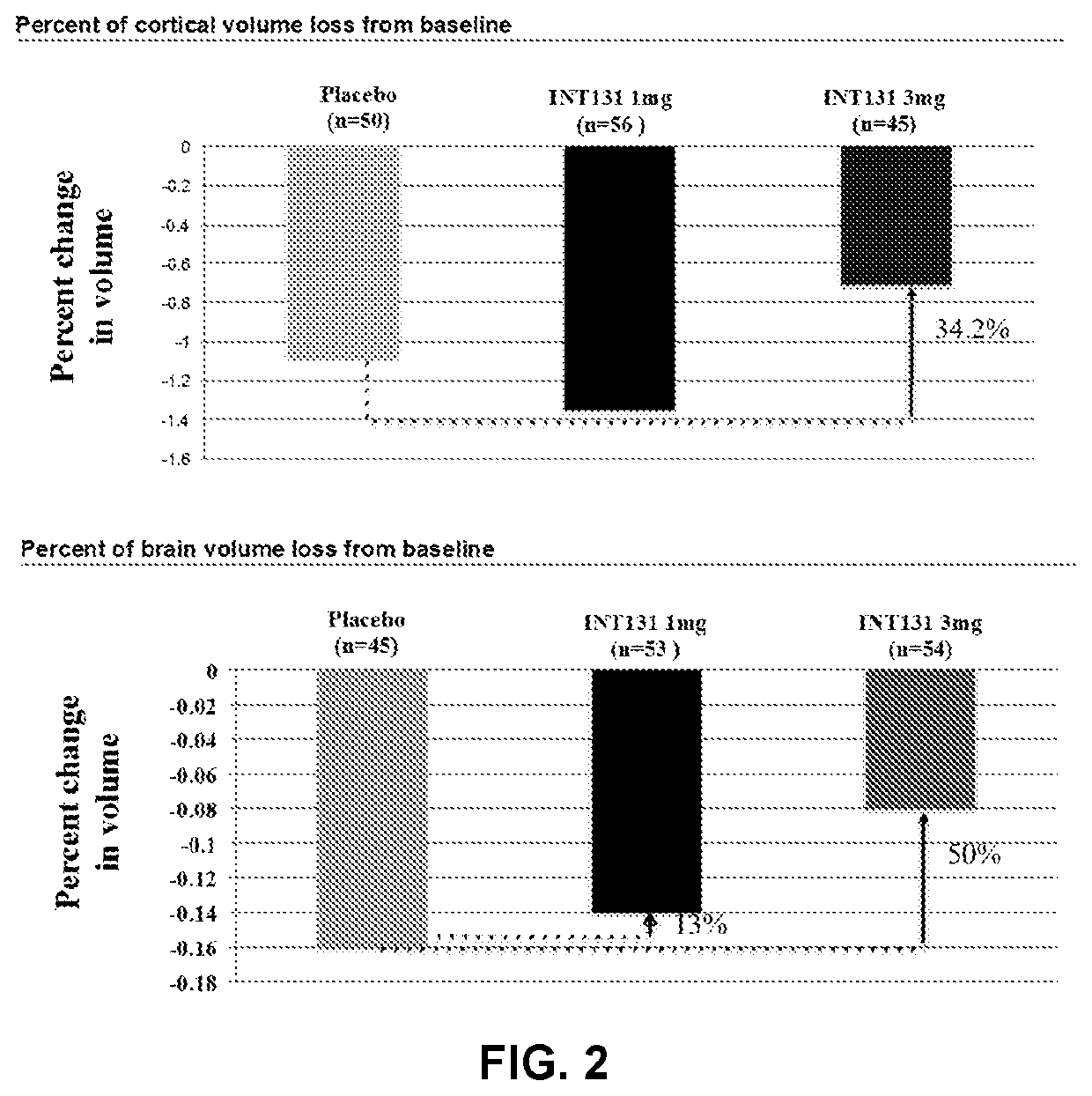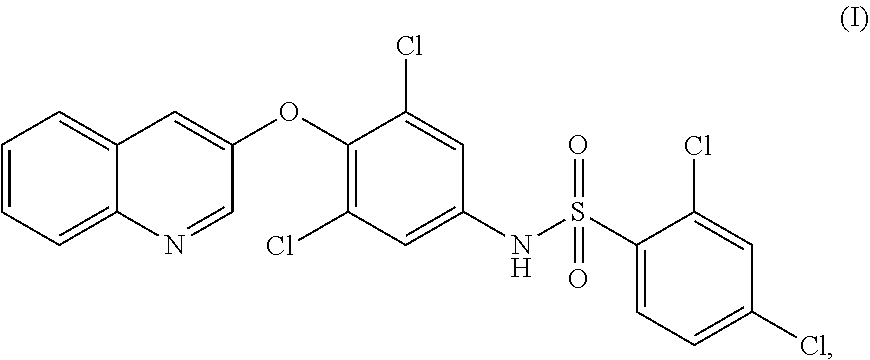PPARy agonist for treatment of progressive supranuclear palsy
a supranuclear palsy and agonist technology, applied in the field of progressive supranuclear palsy treatment, can solve the problems of permanent and irreversible damage that can affect the quality of life of patients, no disease-modifying treatment of psp, no protection of brain cells, etc., and achieve the effect of reducing inflammation
- Summary
- Abstract
- Description
- Claims
- Application Information
AI Technical Summary
Benefits of technology
Problems solved by technology
Method used
Image
Examples
example 1
a Potent Upregulator of Adiponectin in Patients with Reduced Adiponectin Levels
Method
[0175]A randomized, double-blind, placebo-controlled, 24-week study was conducted in which adiponectin levels were measured. The study had a 2-week lead-in period, a 24-week double-blind treatment period and a 2-week follow up period. 367 subjects with type 2 diabetes (TD2)—a disease in which patient adiponectin levels are reduced—were randomly assigned to receive either 0.5, 1, 2 or 3 milligrams (“mg”) of INT131 besylate, 45 mg of pioglitazone or placebo daily for 24 weeks. To measure adiponectin levels blood was drawn at Weeks 0, 2, 6, 12 and 24.
[0176]The results of this study demonstrated that 1, 2, and 3 mg doses of INT131 caused a statistically significant reduction of HbA1c levels as compared to placebo. Further, the study demonstrated that the 2 and 3 mg doses of INT131 reduced HbA1c levels at least as well as 45 mg of pioglitazone, which is an FDA approved treatment for TD2. See, DePaoli, et...
example 2
a Potent Upregulator of Adiponectin in Healthy Subjects
Method
[0184]A study was conducted to determine the effect of INT131 on serum adiponectin levels. Thirty healthy subjects were randomly selected to receive either placebo, 0.1 mg INT131, 1 mg INT131 or 4 mg INT131 daily for 14 days. To measure adiponectin levels blood was drawn at Days 1, 4, 8 and 14.
Results
[0185]From Day 1 to Day 14 administration of placebo and 0.1 mg INT131 resulted in no significant change in serum adiponectin levels and further administration of 0.1 mg INT131 resulted in no significant change in adiponectin levels over placebo. See FIG. 1. However, administration of 1 mg or 4 mg INT131 resulted in a significant change in serum adiponectin levels over placebo and a significant change from Day 1 to Day 14. Thus, administration of INT131 is capable of upregulating adiponectin in healthy individuals (i.e. subjects without reduced adiponectin levels as a result of a disease or disorder).
[0186]Since INT131 upregul...
example 3
Neuroprotective in Neurodegenerative Disease and is Useful in Treating PSP
Methods
[0187]227 treatment-naive adult subjects (mean age 31 [range 18-50]; 65% female) were randomized into one of three arms: oral CHS-131 at 3 mg (n=76); oral CHS-131 at 1 mg (n=76); placebo (n=75), at 21 sites in Russia. 97% completed Part 1. Inclusion criteria: Relapsing Remitting Multiple Sclerosis (RRMS) for ≤3 years, ≥1 gadolinium-positive lesion within 1-year of enrollment, and an EDSS≤6 at screening. The patients underwent monthly MRI examinations with contrast to identify new inflammatory lesions. All Mills were read blinded at the Buffalo Neuroimaging Center (Buffalo, N.Y.). In addition to CE lesions the images were scored for cumulative new / enlarged T2 lesions, and serial cortical and whole brain volumetric analysis.
Results
[0188]CHS-131 treatment resulted in a dose-dependent reduction in cumulative CE lesions over 6 months (complete case analysis). 3 mg daily reduced CE lesion burden by 52% (4.2 l...
PUM
| Property | Measurement | Unit |
|---|---|---|
| oxidative stress | aaaaa | aaaaa |
| muscle rigidity | aaaaa | aaaaa |
| time | aaaaa | aaaaa |
Abstract
Description
Claims
Application Information
 Login to View More
Login to View More - R&D
- Intellectual Property
- Life Sciences
- Materials
- Tech Scout
- Unparalleled Data Quality
- Higher Quality Content
- 60% Fewer Hallucinations
Browse by: Latest US Patents, China's latest patents, Technical Efficacy Thesaurus, Application Domain, Technology Topic, Popular Technical Reports.
© 2025 PatSnap. All rights reserved.Legal|Privacy policy|Modern Slavery Act Transparency Statement|Sitemap|About US| Contact US: help@patsnap.com



